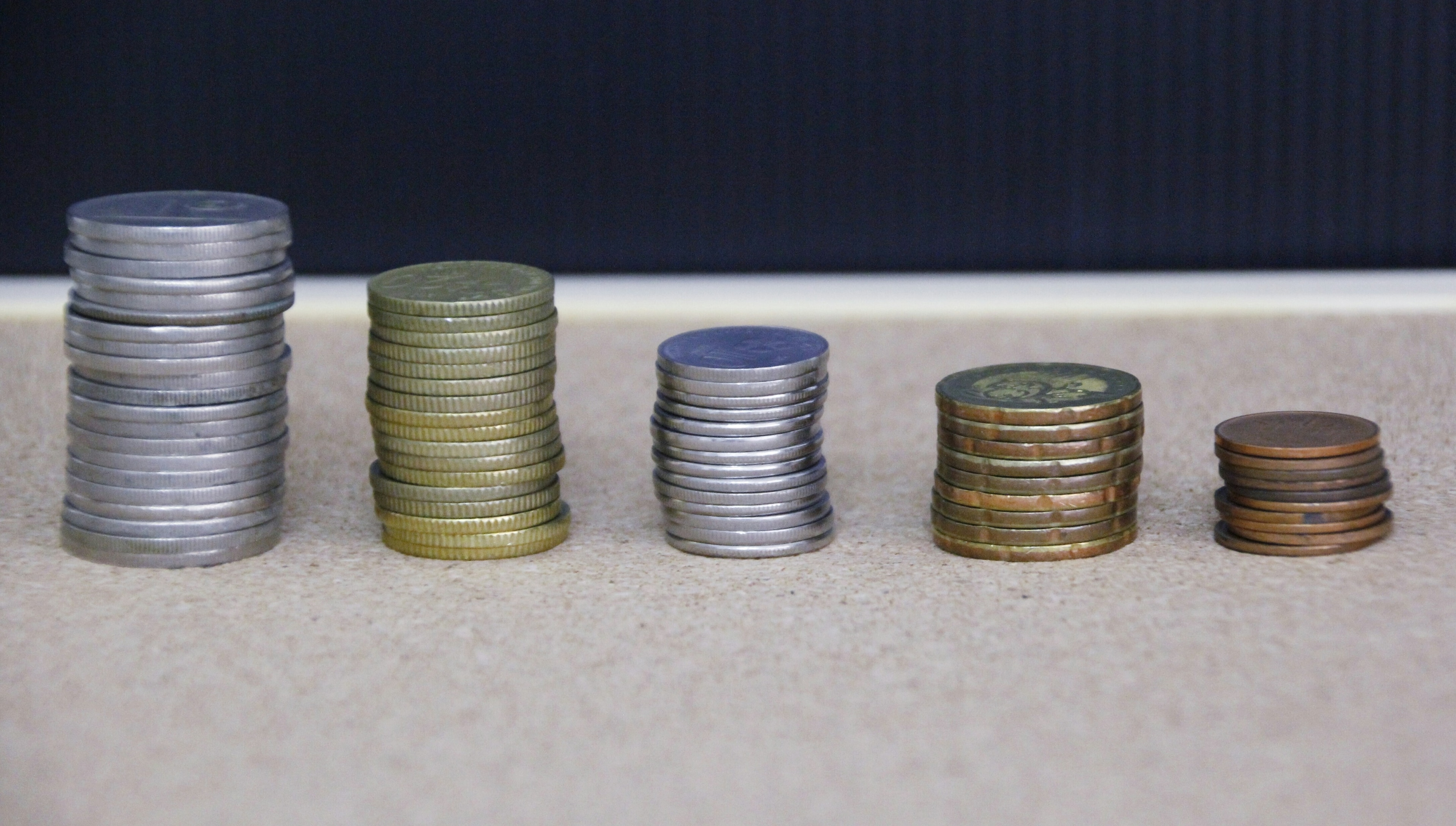What is the future of money?


Get involved with our crowdsourced digital platform to deliver impact at scale
Stay up to date:
Financial and Monetary Systems
Everything has its own time. Everything sprouts, grows, withers, and disappears. This is the cycle of life – and the same process also applies to money and the way you obtain it.
Our perception of money – how it is earned and its value – is undergoing a major change.
You open your wallet and see a dime. The coin is physical, you can pick it up and hold it in your hand, and you are confident that it actually has a value of 10 cents. In a few years, you will most likely be holding a small plastic item shaped as a heart or a star, or you might not even have a wallet and only have access to a virtual currency, which you do not know what looks like. You have to be prepared for a financial revolution in the next 10 to 15 years.
Money as we know it has only existed for a relatively few years – the first banknote was printed in France in the 17th Century. More, recently, however, currencies have started to disappear; more than 600 in the last 30 years, and the trend continues.
What has replaced them?
Several leading experts point out that the current monetary system is bound to undergo significant changes in the years to come because it is compromised by issues such as inflation, the illicit economy and counterfeiting, to name a few. At the Shambala Festival, held in England in August, Jem Bendell offered courses on how to create your own currency.
This situation offers up innovative ways to structure an economic system. The current monetary system might actually be a hindrance to people, countries, and governments to work together more optimally than they do today. The monetary system of the future does not depend upon politicians or bankers but will be managed by communities and lending platforms, such as capitalaid.com and lendingclub.com.
Money changes societies, and societies change money. This is how it has always been and will continue to be. When money was “born,” the population of our planet was around 2 million. Today, there are over seven billion of us. The system is under pressure because of an increased demand for money. A massive demand for financing is created because of the current growth, and this growth has created a historical level of economic debt in the world, which in turn causes the increase of inequality.
Money is printed by banks, and “economy” is created when the banks lend money, including loans to governments and countries. However, the “system” simply does not contain enough money to pay off all the debts in the world today.
The monetary system is at the core of the economic system that we know today. Almost all transactions are based on an exchange of money. It is actually in many cases illegal for two parties to trade services (for example, moonlighting). Money is only valuable as long as the value is guaranteed, and as long as we believe that it is valuable and accept it as a payment method and a reward for goods and services. However, nowadays, the trust in money and its value is under pressure. Trust in this system is being eroded. At the forefront of this movement is the world’s young people and the many small entrepreneurs who cannot obtain access to financing.
In the last 10 years, we have seen how relatively easy it is to defraud, cheat, and lose money in the current financial system. The banks print money out of thin air and profit from doing so. Today, we are closer than ever to a financial revolution in which money will disappear and be replaced by something else. Physical banknotes will be substituted by local social currencies, points that you earn by doing social work, services, or companies’ own currencies based on customer loyalty, among others.
Money goes mobile
The use of credit cards has dramatically increased in recent years. VISA and MasterCard have a share of more than 80% of the global credit card market, and this situation can be viewed as a regular oligopoly (feel free to disagree). However, a new and more comprehensive system is rapidly developing: mobile payment solutions. New technologies are providing new ways to make payments and transfer money via mobile phones, apps, Bluetooth solutions, and so on.
We do not yet fully understand the consequences of a society without money. Even today security is merely a footnote in the recommendations of the European Central Bank. Payment networks, such as SWIFT, PayPal, and Western Union, among others, can close people’s accounts in no time if there is a political disagreement with a Russian, Iranian, or just a politically active account holder. You may call it national security; however, you may also call it financial terror.
What will happen when we will experience massive IT breakdowns that are expected to occur in the future? Future wars will not be fought by troops on land but rather by people sitting behind computer screens. Earlier, banks have not shown the capability of taking timely precautions, and IT companies still lack the evidence to prove that they respect privacy and are capable of protecting sensitive data. Thus, we are facing a completely new and challenging ethical and security-related problem with e-money and virtual payment methods.
The young generations have quickly adopted to the new payment methods, and many of them do not know the feeling of holding a real banknote in their hands. In a way, money is becoming “imaginary,” forming a basis for disloyalty, in particular, among Generation Z (15 to 25 years). Based on estimations, the global “mobile pay” market will surpass $500 billion in 2016. In other words, it is a huge market. This market is still based on money, but money spent by using mobile phones. Because people are not holding the money in their hands, loyalty is likely to decline.
Israel and their many currencies
Israel is known for being a trend-setting nation as far as innovation and IT is concerned. There, entrepreneurs are working on the development of the currency of the future because Israel is a good place to test such new initiatives. The American company Robocoin has set up their Bitcoin ATM, which makes it possible for people to exchange their virtual currency to cash. Israel is currently the world’s most active Bitcoin market and the home to hundreds of new start-up companies that focus on the development of technologies related to virtual money.
One of Israel’s leading economists, Galia Benartzi, who is famous for her “heart money,” believes that the global economic system is deeply unfair and unsustainable. She states that believing that money has a value is an illusion. Therefore, she, together with millions of others, is trying to do something about this. In Israel, there are now no less than 87 passable alternative “currencies” that you can use to buy real estate, books, clothes, food, and so on. These currencies are in direct competition with the country’s official currency, the Israeli shekel.
You encounter names such as Isracoin, Heart Money, and Ripplepay, which do not just boast ethical leadership but also regulations, making them passable as global currencies, credit and lending systems, as well as savings methods. O-share is a good example of a social network where money is created and used in a completely new way. This development stems from lack of trust in banks, because the young people feel that they pay too-high interest rates and because the real-estate market and start-up companies, particularly in Tel Aviv, are under pressure because of lack of financing options for the young people.
The young people simply want more fairness in the financial world. We might think that this ideal is a bit naïve, but many thinkers and researchers argue that this trend will lead to the disintegration of our traditional perception of money. The accrual of social capital is based on services (for example, you take the neighbor’s dog for a walk), and if you need money, you are allowed to print them. However, inflation is avoided because the “ownership” of the money is transparent, and the amount of money people have printed is also transparent.
Young people demand transparency
In Denmark, money is handled by the National Bank and the central banking system. The central banks decide who can borrow money and how much interest they have to pay, and through speculation and manipulation of money quantities and interest rates, they control economic upturns (and downturns). This system does not offer sufficient transparency to satisfy what the young people are looking for.
The system in these new social monetary societies works as follows: participants will be contacted by the society if they save too much and thereby block the flow of the currency. The participants then agree to keep the money flowing so that they can work for the society instead of the money ending up passively in their pocket.
These types of currencies exist all over the world. In Kenya, for instance, microentrepreneurs created a new currency called Banglapesa. These new currencies start out as a kind of money used by people in a group who share commonalities and mutual trust and are not limited by their country’s economic politics and mismanagement. These types of currencies have a significant positive influence in developing countries in particular.
The indication is that traditional banknotes, currencies and transactions will one day disappear. It is merely a matter of time, because it is not supported by the younger generations. Currencies and physical money will die out together with their current fan base.
Author: Soulaima Gourani, Public Speaker, Author, Board Member and Adviser, Tradeconductor.com, Denmark, Young Global Leader
Image: Some of Bitcoin enthusiast Mike Caldwell’s coins and paper vouchers, often called “paper wallets”, are pictured at his office in this photo illustration in Sandy, Utah, January 31, 2014. REUTERS/Jim Urquhart
Don't miss any update on this topic
Create a free account and access your personalized content collection with our latest publications and analyses.
License and Republishing
World Economic Forum articles may be republished in accordance with the Creative Commons Attribution-NonCommercial-NoDerivatives 4.0 International Public License, and in accordance with our Terms of Use.
The views expressed in this article are those of the author alone and not the World Economic Forum.
The Agenda Weekly
A weekly update of the most important issues driving the global agenda
You can unsubscribe at any time using the link in our emails. For more details, review our privacy policy.
More on Financial and Monetary SystemsSee all
Joe Myers
April 26, 2024
Lucy Hoffman
April 24, 2024
Michelle Meineke
April 24, 2024
Annamaria Lusardi and Andrea Sticha
April 24, 2024
Emma Charlton
April 24, 2024
Piyachart "Arm" Isarabhakdee
April 23, 2024






